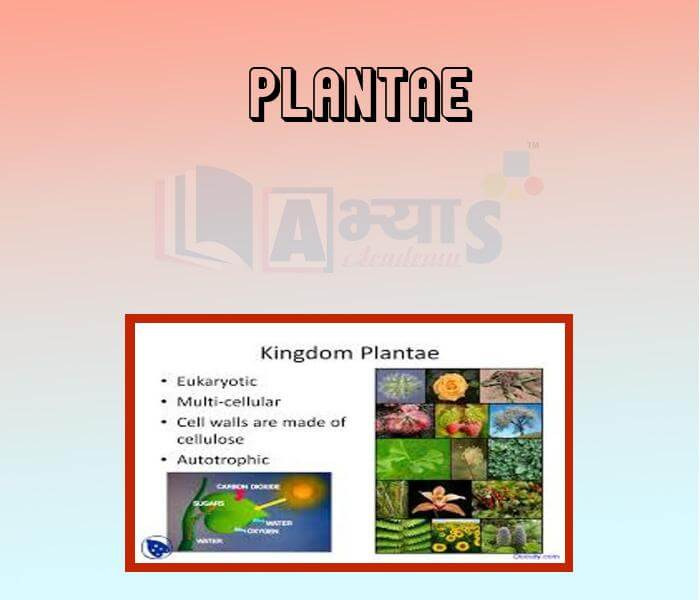Plantae













Plantae
This kingdom includes all plants except some algae like diatoms and members of Monera, Protista and Fungi. These multicellular eukaryotes are autotrophic and have chlorophyll pigments to synthesize food. They include red, brown and green algae, mosses, ferns, gymnosperms and flowering plants. Unlike the members of other kingdoms they have rigid cellulose cell wall.
Plantae or Plant Kingdom:
The kingdom of plants (kingdom Plantae) is divided into two subkingdoms—Cryptogamae and Phanerogamae.
The subkingdom Cryptogamae has the three divisions Thallophyta, Bryophyta and Pteridophyta.
And the subkingdom Phanerogamae is divided into Gymnospermae and Angiospermae. Gymnosperms and angiosperms are grouped together under Spermatophyta which includes all seed-bearing plants.
.png)
The structural material of bacteria wall is _______________ . | |||
| Right Option : B | |||
| View Explanation | |||
Kingdom plantae is divided into __________ groups. | |||
| Right Option : B | |||
| View Explanation | |||
Following are some features of plants.
Which of the combination of above features are typical of desert plants ? | |||
| Right Option : D | |||
| View Explanation | |||
Students / Parents Reviews [10]
It was good as the experience because as we had come here we had been improved in a such envirnment created here.Extra is taught which is beneficial for future.

Eshan Arora
8thIt has a great methodology. Students here can get analysis to their test quickly.We can learn easily through PPTs and the testing methods are good. We know that where we have to practice

Barkha Arora
10thBeing a parent, I saw my daughter improvement in her studies by seeing a good result in all day to day compititive exam TMO, NSO, IEO etc and as well as studies. I have got a fruitful result from my daughter.

Prisha Gupta
8thMy experience was very good with Abhyas academy. I am studying here from 6th class and I am satisfied by its results in my life. I improved a lot here ahead of school syllabus.

Ayan Ghosh
8thA marvelous experience with Abhyas. I am glad to share that my ward has achieved more than enough at the Ambala ABHYAS centre. Years have passed on and more and more he has gained. May the centre flourish and develop day by day by the grace of God.

Archit Segal
7thIt was a good experience with Abhyas Academy. I even faced problems in starting but slowly and steadily overcomed. Especially reasoning classes helped me a lot.

Cheshta
10thOne of the best institutes to develope a child interest in studies.Provides SST and English knowledge also unlike other institutes. Teachers are co operative and friendly online tests andPPT develope practical knowledge also.

Aman Kumar Shrivastava
10thMy experience with Abhyas academy is very good. I did not think that my every subject coming here will be so strong. The main thing is that the online tests had made me learn here more things.

Hiya Gupta
8thAbout Abhyas metholodology the teachers are very nice and hardworking toward students.The Centre Head Mrs Anu Sethi is also a brilliant teacher.Abhyas has taught me how to overcome problems and has always taken my doubts and suppoeted me.

Shreya Shrivastava
8thMy experience with Abhyas is very good. I have learnt many things here like vedic maths and reasoning also. Teachers here first take our doubts and then there are assignments to verify our weak points.
